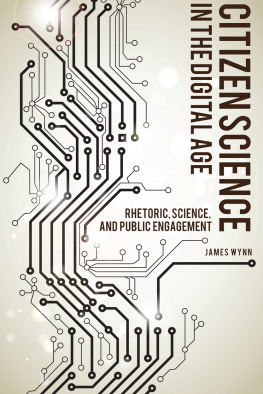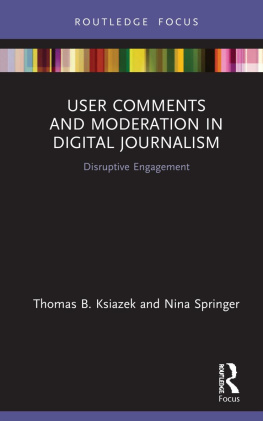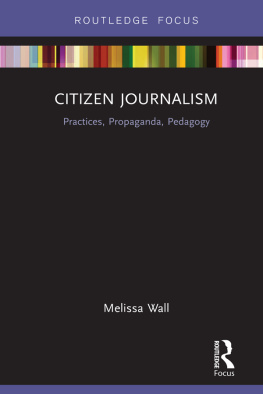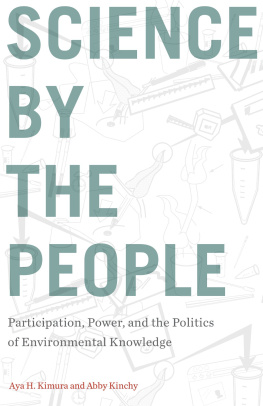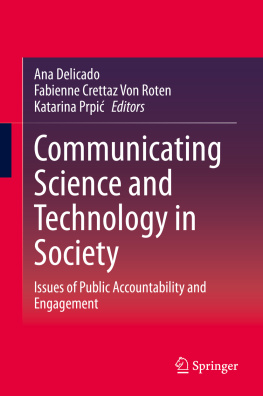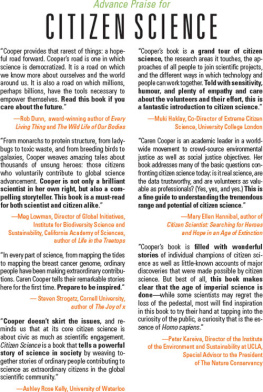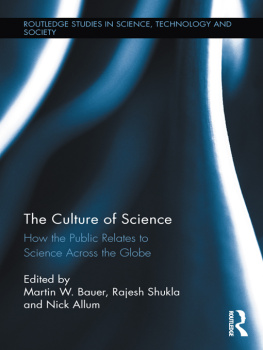James Wynn - Citizen science in the digital age : rhetoric, science, and public engagement
Here you can read online James Wynn - Citizen science in the digital age : rhetoric, science, and public engagement full text of the book (entire story) in english for free. Download pdf and epub, get meaning, cover and reviews about this ebook. year: 2019, genre: Politics. Description of the work, (preface) as well as reviews are available. Best literature library LitArk.com created for fans of good reading and offers a wide selection of genres:
Romance novel
Science fiction
Adventure
Detective
Science
History
Home and family
Prose
Art
Politics
Computer
Non-fiction
Religion
Business
Children
Humor
Choose a favorite category and find really read worthwhile books. Enjoy immersion in the world of imagination, feel the emotions of the characters or learn something new for yourself, make an fascinating discovery.
- Book:Citizen science in the digital age : rhetoric, science, and public engagement
- Author:
- Genre:
- Year:2019
- Rating:3 / 5
- Favourites:Add to favourites
- Your mark:
- 60
- 1
- 2
- 3
- 4
- 5
Citizen science in the digital age : rhetoric, science, and public engagement: summary, description and annotation
We offer to read an annotation, description, summary or preface (depends on what the author of the book "Citizen science in the digital age : rhetoric, science, and public engagement" wrote himself). If you haven't found the necessary information about the book — write in the comments, we will try to find it.
James Wynn: author's other books
Who wrote Citizen science in the digital age : rhetoric, science, and public engagement? Find out the surname, the name of the author of the book and a list of all author's works by series.
Citizen science in the digital age : rhetoric, science, and public engagement — read online for free the complete book (whole text) full work
Below is the text of the book, divided by pages. System saving the place of the last page read, allows you to conveniently read the book "Citizen science in the digital age : rhetoric, science, and public engagement" online for free, without having to search again every time where you left off. Put a bookmark, and you can go to the page where you finished reading at any time.
Font size:
Interval:
Bookmark:

RHETORIC, CULTURE, AND SOCIAL CRITIQUE
SERIES EDITOR
John Louis Lucaites
EDITORIAL BOARD
Jeffrey A. Bennett
Barbara Biesecker
Carole Blair
Joshua Gunn
Robert Hariman
Debra Hawhee
Claire Sisco King
Steven Mailloux
Raymie E. McKerrow
Toby Miller
Phaedra C. Pezzullo
Austin Sarat
Janet Staiger
Barbie Zelizer
The University of Alabama Press
Tuscaloosa, Alabama 35487-0380
uapress.ua.edu
Copyright 2017 by the University of Alabama Press
All rights reserved.
Inquiries about reproducing material from this work should be addressed to the University of Alabama Press.
Typeface: Scala and Scala Sans
Manufactured in the United States of America
Cover design: Michael West
Cataloging-in-Publication data is available from the Library of Congress.
ISBN: 978-0-8173-1943-4
E-ISBN: 978-0-8173-9086-0
The adage it takes a village to raise a child I think can be reasonably applied to books. It was only with the generous help of institutional funding, interviewees, and colleagues that this project has come to be in its current form. In developing this project, for example, visuals emerged as an important locus for exploring the impact of digital technologies and citizen science on communication and argument. In chapter 2, I make the case that the Internet and Internet connectable devices have allowed for the emergence of new kinds of risk representations. To arrive at this conclusion, I rely on evidence from visuals. Although their existence in the book seems like an unremarkable fact of scholarship, I almost did not include them because of the high cost of making the visuals suitable for reproduction. Their presence in this book is made possible through a generous grant from Carnegie Mellons Dietrich College Berkman Faculty Development Fund.
In addition to material support, the scholarship in this book would not have been possible without the cooperation of individuals and institutions that were willing to share their insights and creative productions with me. I would start by thanking the developers of RDTN and Safecast whose work I write about in chapters 2 and 3. In particular, I would like to express my gratitude to the members of these organizations in Japan and on the West Coast who got up early or stayed up late to be interviewed about their work. They include Akiba, Sean Bonner, Peter Franken, Marcelino Alvarez, and Azby Brown. These interviewees provided behind-the-scenes details about the founding and development of RDTN and Safecast, access to their Google Groups discussion board, and permission to use visuals of the Safecast map in this book. Next, I would like to express my appreciation to Anthony Watts and Roger Pielke Sr. whose Surface Stations project is the subject of chapter 4. Both gentlemen offered important historical background on the project and insight into the goals and challenges of its development. I am also thankful to Muki Haklay and Louise Francis of the University College of London who supplied me with details about their citizen-science sound-mappingproject described in chapter 5. They shared with me a transcript and audio file of the community meeting in which citizen scientists and borough representatives discussed the results of their sound-mapping project. The details of community interactions made accessible by these sources provide crucial support for the arguments in chapter 5. Finally, I would like to add a special thanks to Annie Griffin whose citizen-science sound-mapping project did not make it into this book but who generously agreed to be interviewed at a time when I thought it would.
Last, but not least, I want to thank all of those people who have given their intellectual and emotional support to help me develop this book. Among the former, I would like to recognize my graduate research assistant Christy Gelling whose incredible research skills were responsible for identifying many of the texts used as evidence in chapter 4. I also owe her a debt of gratitude for suggesting that the Surface Stations project might be worth exploring. Without her keen sense of scholarly potential, this chapter might have been on something entirely different. I would also like to express my debt to my rhetoric of science colleagues Lynda Walsh and Lisa Kernen who generously agreed to read parts of this book and give feedback. Their insights helped me strengthen my argument and make it more accessible. The clarity and strength of the books arguments are also thanks to all of my colleagues in the field who have attended the talks I have given on chapters in the book and offered insights and critiques. Finally, I would like to thank my wife and my kids for their emotional support and patience as I worked on this project. Without this village, this book would not have been possible.
In the deep jungle, a group of pygmies out for a hunt stop and gather around the shattered remains of trees strewn across the jungle floor. One of the hunters pulls out a small GPS device and marks the spot. Thousands of miles away in an office at the University College London a researcher adds the coordinates to an online map of the Congo already speckled with reported signs of illegal logging activity. Across the Atlantic in Seattle, a teenager plays a computer game carefully manipulating the branch-like shapes of proteins watching her score rise and fall as she optimizes their configurations. Across town, researchers at the University of Washington harness her folding skills to identify protein configurations that might help them synthesize more effective drugs to fight AIDS, cancer, or Alzheimers.
These brief vignettes add to an already substantial list of illustrations of a truism of the digital age: that the Internet has changed the way we communicate and interact with one another. The ubiquity of digital technology and the myriad ways that it has become integrated into the fabric of modern life have changed the quantity of available information, the speed with which it can be accessed, and the distances across which it can be broadcast. Though there is a widely shared recognition that the Internet has transformed the ways we communicate and interact, there is less frequently an understanding of how this technology actually impacts our communications and interactions. Are the pygmies benefitting socially, economically, or politically by electronically marking illegal logging sites? Do virtual protein folding games help laypeople understand the science they are helping advance? These questions are important for researchers interested in tracking the development of the emerging phenomena known as citizen science.
For more than a decade, citizen science has been receiving increased attention because of its potential as a cost-effective method of gathering massive data sets and as a means of bridging the intellectual divide between laypersons and scientists. Despite its possible material and social benefits, littleeffort has been devoted to understanding whether, and if so in what ways, citizen science has been shaping interactions between laypersons, science, scientists, and policymakers. This book explores these poorly understood dimensions of citizen science by assessing real-world discourse, textual and visual, generated by it. In doing so, it endeavors to expand the scholarly investigations in the field of rhetoric of science on a variety of subjects like visual communication, argument from expertise, identification between scientists and laypersons, and the interaction of scientific and nonscientific
Font size:
Interval:
Bookmark:
Similar books «Citizen science in the digital age : rhetoric, science, and public engagement»
Look at similar books to Citizen science in the digital age : rhetoric, science, and public engagement. We have selected literature similar in name and meaning in the hope of providing readers with more options to find new, interesting, not yet read works.
Discussion, reviews of the book Citizen science in the digital age : rhetoric, science, and public engagement and just readers' own opinions. Leave your comments, write what you think about the work, its meaning or the main characters. Specify what exactly you liked and what you didn't like, and why you think so.

